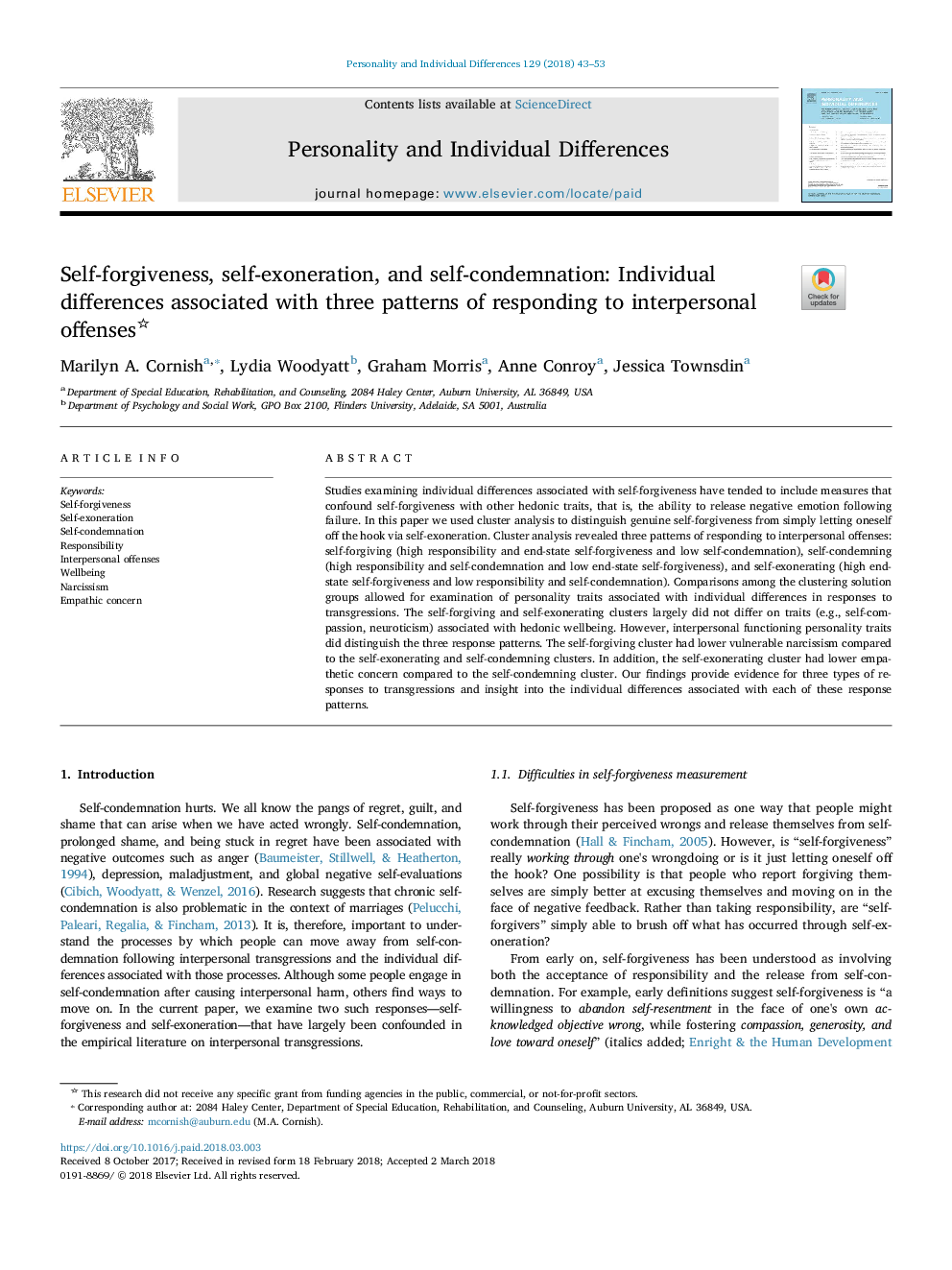ترجمه فارسی عنوان مقاله
خود-بخشش، خودخواهی و خود محکومیت: تفاوت های فردی مربوط به سه الگو برای پاسخ به جرائم بین فردی
عنوان انگلیسی
Self-forgiveness, self-exoneration, and self-condemnation: Individual differences associated with three patterns of responding to interpersonal offenses
| کد مقاله | سال انتشار | تعداد صفحات مقاله انگلیسی |
|---|---|---|
| 115749 | 2018 | 11 صفحه PDF |
منبع

Publisher : Elsevier - Science Direct (الزویر - ساینس دایرکت)
Journal : Personality and Individual Differences, Volume 129, 15 July 2018, Pages 43-53
ترجمه کلمات کلیدی
خود بخشش، خودخواهی، خود محکومیت، مسئولیت، جرایم بین فردی، تندرستی، خودشیفتگی، نگرانی امیدبخش،
کلمات کلیدی انگلیسی
Self-forgiveness; Self-exoneration; Self-condemnation; Responsibility; Interpersonal offenses; Wellbeing; Narcissism; Empathic concern;
ترجمه چکیده
مطالعاتی که در مورد تفاوت های فردی با خود بخشش انجام می شود، شامل اقداماتی است که خودخواهی را با سایر ویژگی های هودونی بدل می کند، یعنی توانایی انتشار احساسات منفی ناشی از شکست. در این مقاله از تجزیه و تحلیل خوشه ای برای تمایز دادن خود بخشش واقعی استفاده می کنیم، به این معنی که از طریق خودخواهی از خود خارج شویم. تجزیه و تحلیل خوشه نشان داد که سه الگو برای پاسخ به جرایم بین فردی وجود دارد: خود بخشودگی (خودکفاء و مسئولیت پذیری بالا و خودپسندی کم پایان)، محکوم کردن خود (مسئولیت بالا و محکوم کردن خود و تسلیم شدن خود در حالت پایانی) و خودخواهی (خود بخشش و مسئولیت کم و محکومیت خود). مقایسه در میان گروه های راه حل خوشه ای امکان بررسی ویژگی های شخصیتی را در ارتباط با تفاوت های فردی در پاسخ به گناه انجام داد. خوشه های خود بخشودگی و خودخواهانه به طور عمده بر صفات (مثلا خودکفایی، روان رنجوری) با رفاه هواداری تفاوت نداشتند. با این حال، ویژگی های شخصیتی عملکرد بین فردی سه الگو پاسخ را تشخیص دادند. خوشه خوف کننده خویش در مقایسه با خوشه های خودخواهانه و خودمحور، دارای عقاید کمتر آسیب پذیر بود. علاوه بر این، خوشه های خودخواهانه نسبت به گروه خواندگی خود محکوم به نگرانی کمتری نسبت به خود داشتند. یافته های ما شواهدی برای سه نوع پاسخ به تخریب و بینش به تفاوت های فردی مربوط به هر یک از این الگوهای پاسخ ارائه می دهد.

